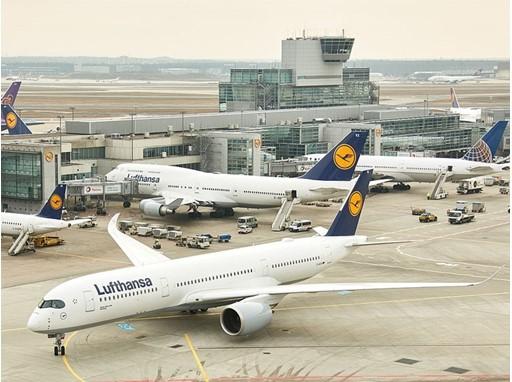European Airlines Ask For Government Help After U.S. Travel Ban

European airlines reeling from the latest blow of a U.S. travel ban have called on governments to immediately ease slot rules, defer taxes and clarify the status of passenger compensation to help them weather the COVID-19 coronavirus storm.
The Airlines For Europe (A4E) industry group said urgent measures were needed to support European airlines in the short-term and aid the industry’s economic recovery.
“In light of the mounting impact of newly imposed COVID-19 travel restrictions in the U.S. and widespread flight cancellations across Europe, A4E airlines are demanding immediate action from European and national governments to reduce the economic impact of the crisis on the aviation sector,” A4E said.
The call came hours after U.S. President Donald Trump ordered a travel ban between the U.S. and mainland Europe for 30 days beginning Mar. 13 for foreign nationals, a controversial move aimed at limiting the spread of the pandemic.
On Mar. 10 the European Commission (EC) promised to help the airline sector by putting in place temporary measures to allow airlines to keep their slots even if COVID-19-related declines in traffic mean they do not operate flights.
But A4E called for “confirmation and immediate implementation of the 80/20 airport slots waiver through the end of the summer season until Oct. 25.”
The industry group said: “A4E welcomes the swift decision taken by the EC to grant airlines a temporary waiver on the ‘use it or lose it’ airport slots regulation, however we are yet to see any clarity on the duration of the waiver. Such a waiver should be valid for the duration of the summer season and requires swift passage in both the European Council and the European Parliament.”
A4E also called for the waiver or deferment of any new aviation taxes at EU or national level. With aviation under growing scrutiny for its environmental footprint, many member states have been calling for a Europe-wide aviation tax.
Clarity was called for by the group regarding COVID-19’s inclusion as an extraordinary circumstance under EU261 compensation rules, given that some European member states have already introduced travel restrictions.
“We are now faced with another situation in which there are no formal rules to limit the financial liability of our airlines in case of extraordinary circumstances, be it the eruption of an Icelandic volcano or the current COVID-19 outbreak,” A4E MD Thomas Reynaert said. “To be clear, airlines will continue to look after our passengers and our staff as best as we can under the circumstances—but immediate action to alleviate the impact of this crisis on our sector is greatly needed. It is also vital that any national measures proposed by third countries to support their national industries do not undermine the competitiveness of European airlines or otherwise disadvantage EU aviation.”
As Europe’s airlines struggled to determine how the ban—which could impact 3,500 flights per week—would work in practice and how it would affect their operations, already hit hard by the travel disruption, flight cancellations and dwindling demand caused by the COVID-19 coronavirus outbreak, EC president Ursula von der Leyen and European Council president Charles Michel criticized Trump’s travel ban.
“The Coronavirus is a global crisis, not limited to any continent and it requires cooperation rather than unilateral action,” von der Leyen and Michel said in a joint statement. “The European Union disapproves of the fact that the U.S. decision to impose a travel ban was taken unilaterally and without consultation. The European Union is taking strong action to limit the spread of the virus.”
Michel also tweeted: “We will assess the situation today. Economic disruption must be avoided.”
Bernstein analyst Daniel Roeska wrote in a Mar. 12 research note: “This ban will impact 3,500 flights per week and up to 800,000 passengers, and we expect the ban to effectively stop air travel between Schengen countries and the U.S.”
The presidential proclamation suspends the entry of most foreign nationals who have been in certain European countries at any point during the 14 days prior to their scheduled arrival in the U.S.
A spokesperson for Lufthansa Group told Aviation Daily in Frankfurt that its network to the U.S. is its most important foreign market in terms of revenue. Italy—where airlines have cancelled flights en masse after the government placed the entire country on lockdown in a bid to slow the spread of the pandemic—is also a significant market for Lufthansa.
Lufthansa Group will maintain some air traffic connections from Europe to the U.S. beyond Mar. 14, operating flights from: Frankfurt (FRA) to Chicago O´Hare (ORD) and Newark (EWR); from Zurich (ZRH) to Chicago and Newark; from Vienna (VIE) to Chicago; and from Brussels (BRU) to Washington (IAD).
The group is currently working on an alternative flight schedule with passengers still be able to reach all destinations within the U.S. via connecting flights served by Star Alliance partner United Airlines.
All other U.S. flights will be suspended until further notice following the ban, including all departures from Munich, Dusseldorf and Geneva. Lufthansa will continue to serve all destinations in Canada until further notice. Meanwhile the impact on Lufthansa’s flight program from the recently changed entry regulations for India is still being evaluated.
In the first nine months of 2019, 4% of Lufthansa Network Airlines’ total capacity was utilized to the Americas, including Mexico and South America, according to the group’s latest financial report. Full-year results are due on Mar. 19.
In Italy, the European country worst hit by COVID-19 so far, Rome airport operator Aeroporti di Roma said Mar. 12 it would downsize its passenger terminal operations. The decision comes after many airlines canceled flights following the government’s move to extend a lockdown to the whole country in a bid to slow the spread of the disease.
From Mar. 17, Rome Fiumicino’s (FCO) Terminal 1 will be temporarily closed, while Terminal 3 will remain in operation.
Rome Ciampino (CIA), which is mainly used by LCCs, will close its terminal for scheduled flights. The runways at both airports will remain fully accessible and will not undergo operational changes. The passenger terminals at Fiumicino and Ciampino airports will resume normal operations as soon as the current state of emergency is over.
Air France said flights to and from the U.S. will operate as normal on Mar. 12 and Mar. 13, and that it plans to continue operations to Atlanta (ATL), Chicago, Detroit (DTW), Los Angeles (LAX), New York (JFK), San Francisco (SFO) and Washington from Mar. 14-28. The airline is awaiting clarification from U.S. authorities on the possibility of continuing service to Boston (BOS), Houston (IAH) and Miami (MIA).
Beyond Mar. 28, Air France is working with its partners Delta Air Lines, KLM and Virgin Atlantic on implementing a plan to continue service to the U.S. for its customers. U.S. routes accounted for 15% of the group’s passenger revenues in 2019.
Finnair said it may need to cut capacity further as a result of the COVID-19 crisis. The carrier said it was cancelling all flights to the U.S. between Mar. 19 and Apr. 12 because of the U.S. travel ban. The oneworld alliance member operates to Los Angeles, Miami and New York JFK. It is also canceling flights to Delhi from Mar. 15-Apr.14 because of visa restrictions that recently came into force in India, which has now banned foreign tourists for a month from Mar. 13.
Finnair expects further impact on narrowbody traffic in Europe because of decreased transfer passenger loads caused by the cancellations.
“Therefore in terms of our long-haul capacity to Asia and short-haul capacity it is foreseeable—fully attributed to the corona effect—we would need to adjust our capacity further downwards, on short-haul also to some extent,” Finnair CEO Topi Manner told Aviation Daily.
A spokesman for Norwegian Air Shuttle said: “We are fully aware of the latest developments concerning travel between certain European countries and the U.S. Our flights to and from U.S. are currently operating as normal.”
Other European airlines contacted by Aviation Daily Mar. 12 were still scrambling to interpret the exact terms of the ban, for example how it would apply to connecting services and to European nationals travelling from airports outside the Schengen area.
The country list does not include the UK and its massive London Heathrow hub, but with flights and trains still operating between mainland Europe and the UK, it was unclear how the ban could work in practice.
Affected countries are: Austria; Belgium; Czech Republic; Denmark; Estonia; Finland; France; Germany; Greece; Hungary; Iceland; Italy; Latvia; Liechtenstein; Lithuania; Luxembourg; Malta; Netherlands; Norway; Poland; Portugal; Slovakia; Slovenia; Spain; Sweden and Switzerland–collectively the Schengen Area.
However, the ban “does not apply to legal permanent residents, (generally) immediate family members of U.S. citizens, and other individuals who are identified in the proclamation,” the statement added.
“The ban is most influential for Lufthansa Group, Delta, and United. Among European majors, IAG is least exposed, as the ban does not include the UK,” Roeska said, but adding that all large airlines would suffer revenue losses through their joint ventures.
LHA-UAL (Lufthansa-United) Atlantic Plus has a 36% share, Air France-KLM-Delta Joint Venture has 29%, and IAG-American Joint Business has 11%, Roeska noted, warning that with North Atlantic routes representing a large part of European airlines’ long-haul profits, the impact of the ban would be more substantial than the one imposed on China.
IAG declined to comment.
Even though cargo does not appear to be included in the ban, fewer passenger flights will mean less belly hold capacity for transporting goods.
“Over time, as the ban continues and potentially widens, this will cause further supply chain disruptions but also benefit cargo-only carriers who can continue to operate flights and will see yields increase,” Roeska said.







